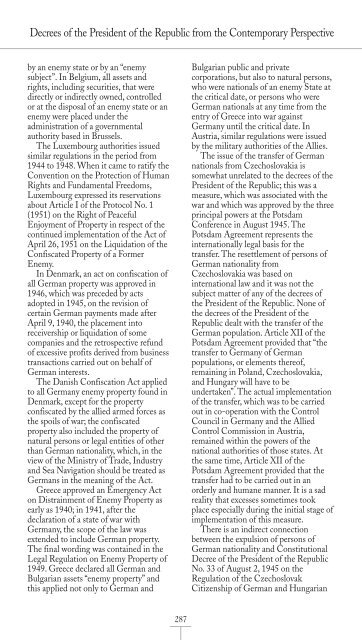the nationality of all inhabitants of the czech provinces and ...
the nationality of all inhabitants of the czech provinces and ...
the nationality of all inhabitants of the czech provinces and ...
You also want an ePaper? Increase the reach of your titles
YUMPU automatically turns print PDFs into web optimized ePapers that Google loves.
Decrees <strong>of</strong> <strong>the</strong> President <strong>of</strong> <strong>the</strong> Republic from <strong>the</strong> Contemporary Perspective<br />
by an enemy state or by an “enemy<br />
subject”. In Belgium, <strong>all</strong> assets <strong>and</strong><br />
rights, including securities, that were<br />
directly or indirectly owned, controlled<br />
or at <strong>the</strong> disposal <strong>of</strong> an enemy state or an<br />
enemy were placed under <strong>the</strong><br />
administration <strong>of</strong> a governmental<br />
authority based in Brussels.<br />
The Luxembourg authorities issued<br />
similar regulations in <strong>the</strong> period from<br />
1944 to 1948. When it came to ratify <strong>the</strong><br />
Convention on <strong>the</strong> Protection <strong>of</strong> Human<br />
Rights <strong>and</strong> Fundamental Freedoms,<br />
Luxembourg expressed its reservations<br />
about Article I <strong>of</strong> <strong>the</strong> Protocol No. 1<br />
(1951) on <strong>the</strong> Right <strong>of</strong> Peaceful<br />
Enjoyment <strong>of</strong> Property in respect <strong>of</strong> <strong>the</strong><br />
continued implementation <strong>of</strong> <strong>the</strong> Act <strong>of</strong><br />
April 26, 1951 on <strong>the</strong> Liquidation <strong>of</strong> <strong>the</strong><br />
Confiscated Property <strong>of</strong> a Former<br />
Enemy.<br />
In Denmark, an act on confiscation <strong>of</strong><br />
<strong>all</strong> German property was approved in<br />
1946, which was preceded by acts<br />
adopted in 1945, on <strong>the</strong> revision <strong>of</strong><br />
certain German payments made after<br />
April 9, 1940, <strong>the</strong> placement into<br />
receivership or liquidation <strong>of</strong> some<br />
companies <strong>and</strong> <strong>the</strong> retrospective refund<br />
<strong>of</strong> excessive pr<strong>of</strong>its derived from business<br />
transactions carried out on behalf <strong>of</strong><br />
German interests.<br />
The Danish Confiscation Act applied<br />
to <strong>all</strong> Germany enemy property found in<br />
Denmark, except for <strong>the</strong> property<br />
confiscated by <strong>the</strong> <strong>all</strong>ied armed forces as<br />
<strong>the</strong> spoils <strong>of</strong> war; <strong>the</strong> confiscated<br />
property also included <strong>the</strong> property <strong>of</strong><br />
natural persons or legal entities <strong>of</strong> o<strong>the</strong>r<br />
than German <strong>nationality</strong>, which, in <strong>the</strong><br />
view <strong>of</strong> <strong>the</strong> Ministry <strong>of</strong> Trade, Industry<br />
<strong>and</strong> Sea Navigation should be treated as<br />
Germans in <strong>the</strong> meaning <strong>of</strong> <strong>the</strong> Act.<br />
Greece approved an Emergency Act<br />
on Distrainment <strong>of</strong> Enemy Property as<br />
early as 1940; in 1941, after <strong>the</strong><br />
declaration <strong>of</strong> a state <strong>of</strong> war with<br />
Germany, <strong>the</strong> scope <strong>of</strong> <strong>the</strong> law was<br />
extended to include German property.<br />
The final wording was contained in <strong>the</strong><br />
Legal Regulation on Enemy Property <strong>of</strong><br />
1949. Greece declared <strong>all</strong> German <strong>and</strong><br />
Bulgarian assets “enemy property” <strong>and</strong><br />
this applied not only to German <strong>and</strong><br />
287<br />
Bulgarian public <strong>and</strong> private<br />
corporations, but also to natural persons,<br />
who were nationals <strong>of</strong> an enemy State at<br />
<strong>the</strong> critical date, or persons who were<br />
German nationals at any time from <strong>the</strong><br />
entry <strong>of</strong> Greece into war against<br />
Germany until <strong>the</strong> critical date. In<br />
Austria, similar regulations were issued<br />
by <strong>the</strong> military authorities <strong>of</strong> <strong>the</strong> Allies.<br />
The issue <strong>of</strong> <strong>the</strong> transfer <strong>of</strong> German<br />
nationals from Czechoslovakia is<br />
somewhat unrelated to <strong>the</strong> decrees <strong>of</strong> <strong>the</strong><br />
President <strong>of</strong> <strong>the</strong> Republic; this was a<br />
measure, which was associated with <strong>the</strong><br />
war <strong>and</strong> which was approved by <strong>the</strong> three<br />
principal powers at <strong>the</strong> Potsdam<br />
Conference in August 1945. The<br />
Potsdam Agreement represents <strong>the</strong><br />
internation<strong>all</strong>y legal basis for <strong>the</strong><br />
transfer. The resettlement <strong>of</strong> persons <strong>of</strong><br />
German <strong>nationality</strong> from<br />
Czechoslovakia was based on<br />
international law <strong>and</strong> it was not <strong>the</strong><br />
subject matter <strong>of</strong> any <strong>of</strong> <strong>the</strong> decrees <strong>of</strong><br />
<strong>the</strong> President <strong>of</strong> <strong>the</strong> Republic. None <strong>of</strong><br />
<strong>the</strong> decrees <strong>of</strong> <strong>the</strong> President <strong>of</strong> <strong>the</strong><br />
Republic dealt with <strong>the</strong> transfer <strong>of</strong> <strong>the</strong><br />
German population. Article XII <strong>of</strong> <strong>the</strong><br />
Potsdam Agreement provided that “<strong>the</strong><br />
transfer to Germany <strong>of</strong> German<br />
populations, or elements <strong>the</strong>re<strong>of</strong>,<br />
remaining in Pol<strong>and</strong>, Czechoslovakia,<br />
<strong>and</strong> Hungary will have to be<br />
undertaken”. The actual implementation<br />
<strong>of</strong> <strong>the</strong> transfer, which was to be carried<br />
out in co-operation with <strong>the</strong> Control<br />
Council in Germany <strong>and</strong> <strong>the</strong> Allied<br />
Control Commission in Austria,<br />
remained within <strong>the</strong> powers <strong>of</strong> <strong>the</strong><br />
national authorities <strong>of</strong> those states. At<br />
<strong>the</strong> same time, Article XII <strong>of</strong> <strong>the</strong><br />
Potsdam Agreement provided that <strong>the</strong><br />
transfer had to be carried out in an<br />
orderly <strong>and</strong> humane manner. It is a sad<br />
reality that excesses sometimes took<br />
place especi<strong>all</strong>y during <strong>the</strong> initial stage <strong>of</strong><br />
implementation <strong>of</strong> this measure.<br />
There is an indirect connection<br />
between <strong>the</strong> expulsion <strong>of</strong> persons <strong>of</strong><br />
German <strong>nationality</strong> <strong>and</strong> Constitutional<br />
Decree <strong>of</strong> <strong>the</strong> President <strong>of</strong> <strong>the</strong> Republic<br />
No. 33 <strong>of</strong> August 2, 1945 on <strong>the</strong><br />
Regulation <strong>of</strong> <strong>the</strong> Czechoslovak<br />
Citizenship <strong>of</strong> German <strong>and</strong> Hungarian


